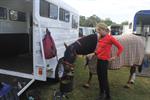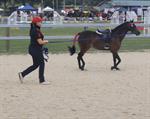 Advance your knowledge of Equine Husbandry
Advance your knowledge of Equine Husbandry
- Learn to work with horses.
- Excellent foundation course offering a well-rounded education in equine and large animal husbandry.
- Start your studies here; expand your knowledge and skillset; gain employment in the field or advance within your workplace.
Feeding and Watering the Grass Kept Horse
Feeding a grass kept horse appropriately will depend on the quality of the grass available, the time of year, the type of horse and the amount of work that the horse is expected to do.
During the spring, grass is generally very lush and although not always a problem, it can cause obesity, laminitis and other health problems; restricting access to grazing may need to be considered. This can be achieved by putting a grazing muzzle on the horse or fencing off a portion of the field to provide a starvation area.
If the horse is a ‘good-doer’, the grass quality is sufficiently good and only very light work is expected, then a diet of grass alone may be enough to supply the energy and nutrients required.
A horse kept at grass all year round will most likely need some type of supplementary feeding in the winter months when grass is in short supply and its nutrient value is negligible. Additional feeding may be in the form of hay or haylage and/or a concentrate feed. Hay can be easily fed by placing a number of piles in the field to encourage the horse to move around and pick from. Concentrates are easily delivered in a bucket or trough in the field. It is better if possible to feed the grass kept horse more than once a day, particularly in the winter months.
If the summer months are particularly dry then grass growth will be affected and the little that grows may become parched and lose much of its nutrient value. Supplementation with hay may also be required at this time of year as well as in the winter.
The following general rules of feeding should be remembered:
- Feed by weight not volume of feed. To ensure you are feeding the correct quantities you need to weigh one scoop of each different type of feed you use.
- Concentrates must be fed ‘little and often’
- Always use high quality feeds.
- Feed according to body weight and temperament
- Make any changes to the diet gradually to reduce the risk of digestive upsets
- Don't exercise directly after feeding
- Feed at the same time each day
- Increase feed quantity and energy content according to the level of work your horse is doing
- Feed plenty of good quality roughage
Although the horse is able to survive a fair length of time without food, it is unable to live long without water; without an adequate supply the horse’s body will cease to function properly. Ensuring that the grass kept horse has an adequate supply of clean, fresh water is of particular importance.
 Water can be supplied to the grass kept horse in a number of different ways. These include:
Water can be supplied to the grass kept horse in a number of different ways. These include:
- Automatic Water Trough. This may be the best method as it provides a constant supply of fresh water. The ball cock may freeze or block up. Ice may need breaking in winter; put an inflatable football or similar in the trough to prevent freezing over. It must be thoroughly cleaned regularly.
- Bath or Trough. This has the advantage of ensuring plenty of water is available. It may however need to be manually refilled daily. Water can quickly become stagnant. There is a danger from injury on sides of bath unless boxed in. Taps must be removed to prevent injury.
- Natural Running Streams. Running water is good if there is a gravel bottom and good approach for the horse. This can be a constant supply of fresh water, but pollution from upstream can contaminate the water. It may flood or dry up in extreme weather conditions. If it has a sandy bottom and the horse ingests any of the sand, it can cause colic. If excessively muddy it can cause mud fever or the horse may not go down to drink and become dehydrated.
- Springs can supply a constant source of fresh, clean water; but the spring channel must be kept clear for excess water to drain away freely.
- Ponds are sometimes used but can be stagnant water for most of the time. An alternative water supply will be necessary if it is stagnant; and ideally the pond should then be fenced off.
- Buckets -Easy to monitor the amount of water that the horse is drinking. This is a time consuming method needing to be filled at least twice a day. Can easily get knocked over, split or broken and the horse will be without water.
Why Study with ACS?
Design your own learning pathway.
Study at your own pace, from anywhere, at any time.
Receive prompt, expert support from our team of committed and friendly tutors.
Your learning is our priority. We are flexible and adaptable to meet your educational needs!
Enrolling is easy - just go to the top of this page and select your study method and payment option.
If you have any questions about studying with ACS, or want to know more about any of our courses, get in touch with our specialist tutors today.
They will be happy to answer your questions and look at different study options to fit in with your goals.